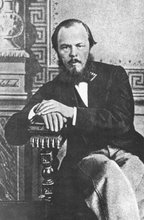
In Dostoevsky's "Brothers Karamazov" polyphonic novel, there are many routes that one can take through the narrative. Think of running a knitting needle through a tangled skein, and there you have it. Grushenka is the fascinating fallen angel, a "provincial haetera" of unusual charm (504). She is seduced at seventeen by a Polish officer, and then is taken up a "protector," an ugly, old merchant in a small town. She waits in a provincial backwater, scheming her revenge and/or restoration with the Polish officer, meanwhile fascinating many men of the town, but yielding to none. Fyodor, the libidinous patriarch of the Karamazovs, is mad for her. His oldest son Dmitri is also mad for her, abandoning and cheating his respectable (but mean, and partially compromised) fiance, Katya, for her. For his passion for Grushenka, Dmitri is brought to utter ruin, charged and convicted with the murder of his father. He loses his honor entirely, by keeping rubles entrusted to him by his fiance in order to bankroll a hoped-for elopement with Grushenka. Grushenka wants to restore her lost reputation by marrying her now-widowed seducer, the Polish officer, after five long years of waiting. He turns out to be too old for her, he has lost his charm, is "like a father," and wears a lousy toupee (430). She runs her fingers through the fair curls of a pretty younger man, Kalganov, and is "clutching" his hand as Dmitri strides in to her rescue (416). Earlier, Dmitri's own innocent and saintly brother Alexei calmly embraces her, while Grushenka sits seductively on his lap: she has paid twenty-five roubles to an unbeliever to bring the lovely monk to her. He decides, she is an angel. A young lawyer of the town, Nikolai, goes about saying she has upper class manners (504)! Grushenka ends up living with another old man, Maximov, a charity case. Gruschenka can't get away from men, they flock to her, they fall at her "little feet." She prefers the young, good-looking ones, but suffers all of them quite democratically. The story might be said to be a tale about sexual jealousy in men, especially as between older men (who can afford love) and younger men (who attract love). Grushenka has a talent for both money and men. She has become a financial asset to her ancient merchant, his bookkeeper, in fact, she is herself a money-lender for interest and has accumulated a tidy pile. She is able to keep them all in her power through love or money. The only two who remain cold to her, Ivan and Smerdyakov, are immune to these two charms. Her name is Agrippina, after the mother of Caligula and Nero (Agrippina the Older and the Younger), famous plotters and seducers. Seen from the twenty-first century, Grushenka might be considered a victim of sorts, but given the damage that is dealt out in her name: death, exile and punishment, disgrace, one wonders if this shoe fits the seductive curve of that lovely little foot.
Photo credit: alas, is lost in hyperspace. This jpg was called "Olga in a Black Wig."
